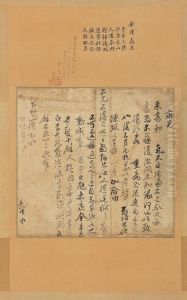Kim Jangsaeng Paintings
Kim Jangsaeng, also known by his pen name Pyoam, was a prominent Korean scholar, politician, and calligrapher during the Joseon Dynasty. Born in 1548 in Goryeong, Gyeongsang province, he was a member of the esteemed Goryeong Kim clan. He is particularly revered for his accomplishments in education and his contributions to Neo-Confucianism in Korea.
Kim Jangsaeng passed the state examination at the young age of 21 and embarked on a career in public service. He held various government positions throughout his life, but his academic and educational contributions are most notable. He was a staunch advocate for the importance of education and scholarly pursuits. Kim believed that the foundation of a virtuous and well-ordered society lay in the education of its people, especially the youth.
As a scholar, Kim Jangsaeng was deeply involved in the studies of Confucian classics and worked to spread Neo-Confucian ideology. He was also instrumental in establishing several private Confucian academies, known as Seowon, to educate young scholars and promote Confucian learning. These academies played a critical role in the intellectual and cultural development of Korea during the Joseon Dynasty.
Aside from his scholarly pursuits, Kim was also an accomplished calligrapher. His works were highly prized for their elegance and expressive quality. Unfortunately, much of Kim Jangsaeng's calligraphy and writings were lost over time, and only a few have survived to the present day.
Kim Jangsaeng's legacy extends beyond his lifetime, and he has been honored posthumously for his contributions to Korean culture and education. His efforts in promoting Confucian values and education have left a lasting impact on Korean society. He died in 1631, but his dedication to scholarship and moral integrity continue to be celebrated in Korea.
